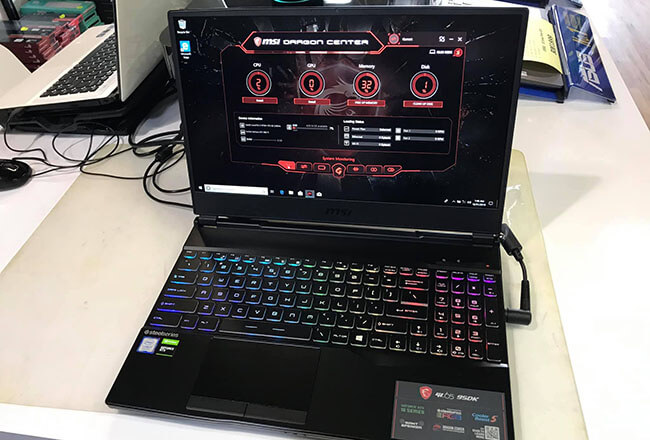A buzzing noise originating from your laptop is usually an indication of hardware failure. However, determining which hardware component is faulty might be difficult.
By listening carefully, you can often determine where the buzzing noise is coming from. Put your ear to your laptop and try to figure out which component is producing the commotion.
This is often easier to accomplish on desktop computers than on laptop computers.
That being said, don’t be concerned if you can’t pinpoint the particular portion causing the issue. I’ll walk you through the issues and possible solutions.
A laptop buzzing noise can be caused by:
- Coil whining
- Clogged laptop fans
- Failing HDD
- CPU overload
- Loose screws and wires
- Faulty/ Dusty DVD/CD-ROM
First, determine where the noise is originating from and make the necessary adjustments to lessen the noise.
6 Possible Reasons & Solutions for Laptop Buzzing Noise Fix

Problem-1: Coil Whining
Coil whine is an electromagnetic phenomenon in which coils within specific electrical components begin to vibrate at precisely the proper frequency to generate an audible and irritating whining noise – hence the name.
Coil whining is most commonly connected with GPUs in current laptops when they are under severe stress from either playing demanding games or editing 4k footage.
Power adapters used to charge laptops or give power to big displays are another prominent cause of coil whining. It most commonly occurs with older devices that require power bricks.
How to Resolve Coil Whining?
The terrible thing with coil whining is that once you have it, there isn’t much you can do about it. Furthermore, because most manufacturers do not provide a guarantee for coil whining, it cannot be replaced.
As a result, if you detect noise coming from your GPU, I recommend not getting too worked up about it. Wear an ANC (Active Noise Cancellation) headset when playing the visually heavy titles to block out the noise.
If the coil whine is coming from the power adapter, place it as far away from your device as feasible to decrease noise. Avoid covering up the power adapter and dampening the noise, as this might cause overheating and even explosions.
Turning off Overclocking & Limiting the in-game Framerate & turning on the Vsync can reduce Coil Whining.
Because there is no cure for coil whining, the best approach to avoid it is to buy components that are not susceptible to it.
As a result, before purchasing new gear, it’s critical to read user reviews to discover if other customers are complaining about the noise levels.
Problem -2: Clogged Laptop Fans
The most usual source of laptop buzzing noises is dirty case fans. Unfortunately, dust accumulates on the fans over time, making it more difficult for the fans to cool your desktop or laptop.
As a result, it begins to spin faster, producing a light buzzing or whirring sound. Similarly, if the laptop lacks proper ventilation, the fan will overwork and become noisy. This happens most often when you set your laptop straight on your bed or a pillow.
How to Unclog a Laptop Fan?
Simply running a dust blower or electric duster over dusty fans is the best method to clean them. Also, if you’re technically inclined, you may disassemble your system and physically clean away the dust.
This is best accomplished with a microfiber cloth and little pressure. The fans are composed of plastic and are prone to breaking or bending. Aside from that, it’s also a good idea to provide the fans some room to allow for clean circulation. Use a laptop stand instead of setting it on top of your bed or a pillow to do this.
If the fan is still noisy after cleaning it thoroughly, it is time to replace it.
Problem -3: Failing HDD
A regular Hard Disk Drive (HDD) might make a low hum or clicking noise. This is due to the fact that several components within an HDD are moving at fast rates.
If these components wear out or come into touch with one another, an audible buzzing, whizzing, or grinding sound may be created. You could even hear thuds from time to time.
These sounds are essentially warning indicators that the HDD is failing, which can occur anywhere between a few minutes and a few months.
Because it’s difficult to predict when this may happen, it’s highly suggested that you backup your data and get the drive replaced.
How to fix Failing HDD?
You can’t do much if your hard drive fails.
Your only alternatives are to back up the data to a new, functional HDD or, preferable, an SSD (Solid State Drive), which has no moving components and lasts longer than HDDs.
But how can you tell if it’s the HDD or the buzzing noise from your laptop that’s causing the problem?
A failing HDD also causes additional issues, such as sluggish read and write rates. You may also notice that some of the files on your hard disk have become corrupted.
Problem – 4: CPU Overload
If you only hear a loud buzzing noise when playing graphically taxing games or editing 4K films, it’s most likely due to CPU overloading.
When the CPU gets heated while doing CPU-intensive tasks, the fans kick into high gear to keep the system cool.
As a result, the high-speed fans emit an audible buzzing sound. This can be aggravating, but it is quite natural.
You may also hear the noise while starting a certain software, even if it is a low-resource-intensive one.
In that situation, a bug or virus within the software that causes significant CPU utilization might be to blame.
How to Resolve CPU Overload?
Follow these methods to evaluate whether the noise is caused by excessive CPU consumption and then resolve it:
- On Windows, use Ctrl+Shift+Esc to launch the Task Manager and select Processes.
- Examine the list of all running programs and processes on your system to determine if any of them are causing your CPU utilization to spike. If so, you’ve located your perpetrator.
- Simply uninstall the software if it isn’t something you use. However, if you do use the app, make sure no other apps are active at the same time. You’ll free up CPU resources and allocate them to a single app, which will lessen overall stress.
Another thing to keep in mind is that some infections might cause excessive CPU utilization. If you believe your machine has been infected, use anti-virus software to detect and remove the malware.
Problem – 5: Loose Screws & Wires
Loose screws and wires/cables are more prevalent on desktop computers. Unless a laptop has recently been disassembled for an update or repair, this problem is unlikely to occur. A stray cable will occasionally go close to one of the fans. It is then frequently struck by the fan blades, resulting in a buzzing or fast clicking noise.
A loose screw, on the other hand, might misalign the structure of the casing, which may slightly displace the fans. When a fan is not rotating, it might vibrate against the surrounding components, producing a faint rattling or buzzing noise.
How to Repair Loose Screws & Cables?
Simply tightening loose screws should do the trick. If required, ensure that the case is properly aligned beforehand.
Notably, this is much easier on desktop computers than on laptop computers. Furthermore, tampering with the internals of the laptop on your own might void the warranty.
For these reasons, I recommend having a professional inspect your laptop if you suspect it has a loose screw or wire inside.
Problem – 6: Faulty or Dusty DVD/CD ROM
While in use, DVD/CD-ROMs emit a faint buzzing noise. This occurs when the CD or DVD is placed into the device as it rotates at fast rates while it reads it.
In general, this noise isn’t very loud or bothersome. However, if the ROM is broken, it might cause audible buzzing and crackling. Aside from that, a DVD/CD-ROM can begin to rumble if dust particles become caught inside it or if a damaged or badly scratched-up DVD/CD is inserted.
How to fix Faulty or Dusty DVD/CD ROM?
- Open the DVD/CD-ROM and clean it with a dust blower.
- Check for damages or breaks on any DVDs or CDs you have inside. If this is the case, stop using the disk and throw it away. If it’s still in good condition, use a microfiber cloth to clean it and remove any dust particles.
- Replace the cleaned disc in the ROM to see whether it is still producing noises. If this is the case, the ROM is most likely damaged and will need to be repaired or replaced.
It should be noted, however, that if you hear a buzzing noise emanating from the device while no disk is inserted, it is preferable to contact a professional.
Conclusion:
While the exact amount of time varies depending on the manufacturer and model, in most circumstances, you can anticipate your gaming laptop to last between 3 and 6 years.
At that time, you’ll either have a hardware failure, or your laptop’s specs will just be unable of keeping up with current games.
Until then enjoy your favorite games on your laptop.
